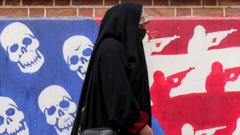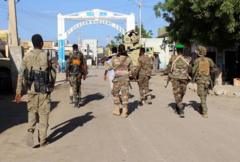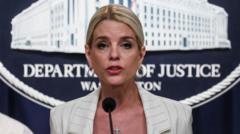As the US administration looks to revive stalled nuclear negotiations with Iran, significant gaps in both sides’ positions underscore the complexity of reaching a resolution. With military threats looming, both countries face pressure to engage effectively within a limited timeframe.
Diplomatic Deadlock: US and Iran Approach Nuclear Talks with Divergent Interests

Diplomatic Deadlock: US and Iran Approach Nuclear Talks with Divergent Interests
Tensions escalate as the US and Iran prepare for new discussions regarding Iran's nuclear program, amid fears of military action and the ramifications of failed negotiations.
Diplomatic observers are keenly watching as the US and Iran prep for potentially pivotal nuclear negotiations, sparking fears of escalating tensions or even military conflict. The stakes are high, with many warning that another failure could lead to dire consequences in the already volatile Middle East region.
Recently, the Biden administration signaled its intent to revive talks surrounding Iran’s nuclear ambitions, which had reached an impasse since former President Trump's withdrawal from the Joint Comprehensive Plan of Action (JCPOA) in 2018. Back then, significant sanctions were reinstated after Trump argued the deal allowed Iran to fund terrorism while limiting its nuclear capabilities inadequately. In response to increasing economic pressure, Iran, too, has advanced its uranium enrichment, raising alarms about the potential for weapons-grade material.
Amidst these developments, President Biden's administration is set on negotiating a new deal that satisfies concerns about Iran's nuclear program while addressing the economic turmoil the nation faces. Iran’s Supreme Leader, Ali Khamenei, has indicated openness to discussions under the right conditions, but any progress remains complicated by internal hardliners who resist concessions, especially related to nuclear enrichment.
The upcoming talks to be held in Oman are critical, as they represent a unique chance to engage with Iran diplomatically. Analysts predict that the US will push for a comprehensive agreement which entails not only curbs on Iran’s nuclear ambitions but also demands to cease its support for proxy militia groups, which remain major points of contention in negotiations.
Both nations remain distant in their negotiating stances; the US stands firm on a complete halt to Tehran's nuclear aspirations, while Iran is likely to resist any terms that impede its right to develop nuclear technology for peaceful purposes. The trajectory of these discussions could dictate future geopolitical stability, not only for the involved parties but for the broader region, impacting allies including Israel, which has declared a stark position against any Iranian nuclear capabilities.
As momentum builds for the forthcoming talks, the world watches closely. With both sides needing to navigate a complex web of historical grievances, tactical expectations, and geopolitical realities, the possibility of a successful diplomatic resolution or an escalation into conflict remains uncertain. The clock is ticking, and the diplomatic community is hopeful yet wary of what lies ahead in these crucial negotiations.






















